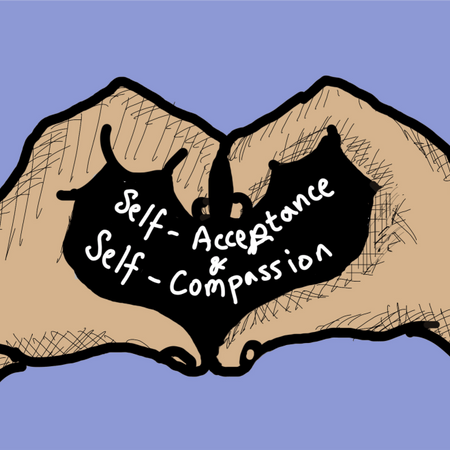
Self-Acceptance - Part 2
BEAUTIFUL ME (Series) - Self-Acceptance (Part 2)
“Radical Acceptance is the willingness to experience ourselves and our life as it is. A moment of Radical Acceptance is a moment of genuine freedom”
How does self-acceptance affect your day-to-day life? The quote you just read sums it up perfectly; a moment of acceptance is a moment of genuine freedom. Now imagine a consistent feeling of freedom and peace; everything else pales in comparison to that feeling. If you are unable to re-trace or recollect such a feeling or you’ve never experienced a moment of blissful content then take a walk with me through this hypothetical situation. Free your mind and focus solely on the task at hand and the feelings that this particular situation will elicit. Now imagine being wrongfully convicted of a crime, your innocence snatched from your palms by strangers and the sentence is life imprisonment without the possibility of parole. You are bound, your movements severely restricted and taken to a miniscule cell with no windows, no sunshine and no perception of time. Here you will spend your days and your nights. Restriction and limitations are all you will know and what little reprieve you might get is at the discretion of someone else, another stranger; the warden perhaps. What emotions does this situation elicit: Fear? Discomfort? Sadness? Flight? Fright? A lack of self-acceptance is almost like being a prisoner however much worse. The cell is your own mind and thoughts, the warden your actions or lack thereof and the judge and jury your vulnerability to society’s prejudices. With that distasteful situation in mind, find your most content and peaceful moment and amplify those feelings by a thousand, that is self-acceptance; earth shattering peace and freedom.
Self-acceptance helps you to regulate your emotions; adopting healthier practices when dealing with situations and day to day interactions. From a biological and chemical perspective, a lack of self-acceptance creates an imbalance in the part of your brain responsible for emotional control. The behavior usually exhibited includes unnecessary outbursts, anxiety, stress, or anger. This lessens your capacity to experience happiness in all its forms. From a psychological viewpoint a lack of self-acceptance negatively modifies your emotional well-being. It alters your thought process in that you place your flaws under a microscope, constantly assessing, theorizing and complaining. The negative thoughts then lead to negative responses and behavioral patterns. Back then when I was muddling my way through the murky waters of society’s opinions and standards, I lived in constant fear and anxiety. I felt shackled and bound to a persona that was not my own. My intentions and behaviors mimic how I felt. The chains didn’t fall until I accepted and decided to love all of me.
In comparison, self-acceptance in all forms and on all levels are linked to more emotional depth and a better outlook on life. Self-acceptance is a known confidence booster and acts as a buffer between your emotions and the effects of stress and depression. A confident person is more likely to take risks that would benefit them in the long run with an awareness that failure is a temporary road block to success. Confidence also gives you that edge where your decisions are based on your own agenda rather than the approval of others.
More importantly self-acceptance encourages forgiveness, not for others but yourself. This is by the far the most favorable and instrumental side effect to loving and appreciating all that you are. Contrary to popular belief it is far easier to forgive others than it is to cut yourself some slack. Humans tend to be much harder on themselves striving for perfection while accepting everyone else's flaws and faults. According to Dr. Srini Pillay of Harvard Medical School, acceptance and forgiveness go hand-in-hand. He says that the inability to accept and forgive ourselves causes us to split into different parts. These two parts — the one that needs to be forgiven and the one that needs to forgive — are at odds with one another. Self-acceptance can help you bridge the gap between them, enabling you to forgive yourself for your mistakes and move on. With self-acceptance you love yourself a little bit each day thereby giving yourself a little bit more wiggle room to make mistakes. You realize you accept your imperfectness and adjust your expectations.
Self-acceptance leads to self-compassion. According to self-compassion researcher Kristin Neff, self-compassion is more important for our mental and emotional well-being than self-esteem. She describes self-compassion as giving yourself “the same kindness and care you would give to a good friend.” These past couple of months have been a lesson in self-compassion. A few weeks ago, a friend pulled me to the side and said to me "Mo, the kindness and affection you give to others you need to give to yourself also.” He continued “You give so much to others, you show up for others, you share, you care, but who does all these things for Mo.” I made a conscious decision to offer myself the same kindness, the same to shoulder to cry on and the same hand to hold.
Self-acceptance helps you be the best version of yourself…... Yasssssss. A lack of self-acceptance leads to repression, adoption and censorship. You find yourself trying to repress your feelings, censoring your behaviour and adopting society’s warped view of perfection. With self-acceptance you are able to build on and utilize both flaws and strengths. That leads to you putting your best foot forward, working towards progression in all facets of your life. Shouldn’t that be our all-consuming goal? Shouldn’t we aim to write our own stories; playing both villain and hero? Shouldn't this be our end game?





